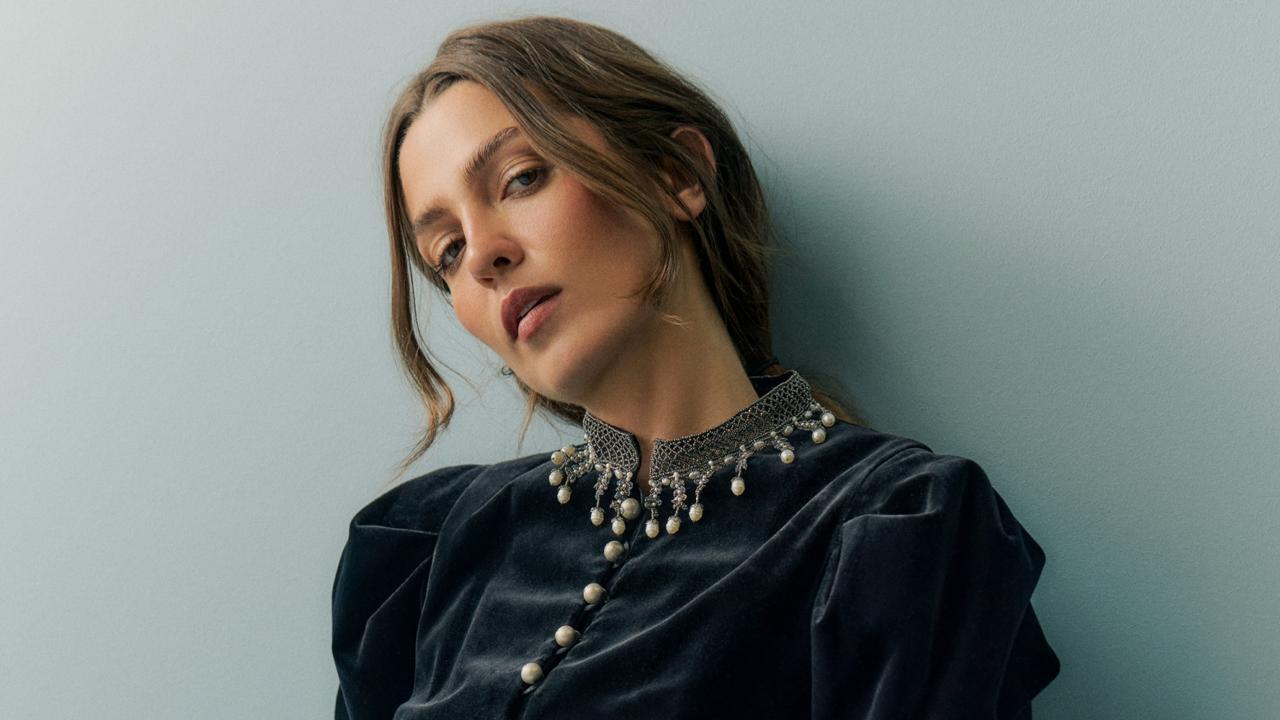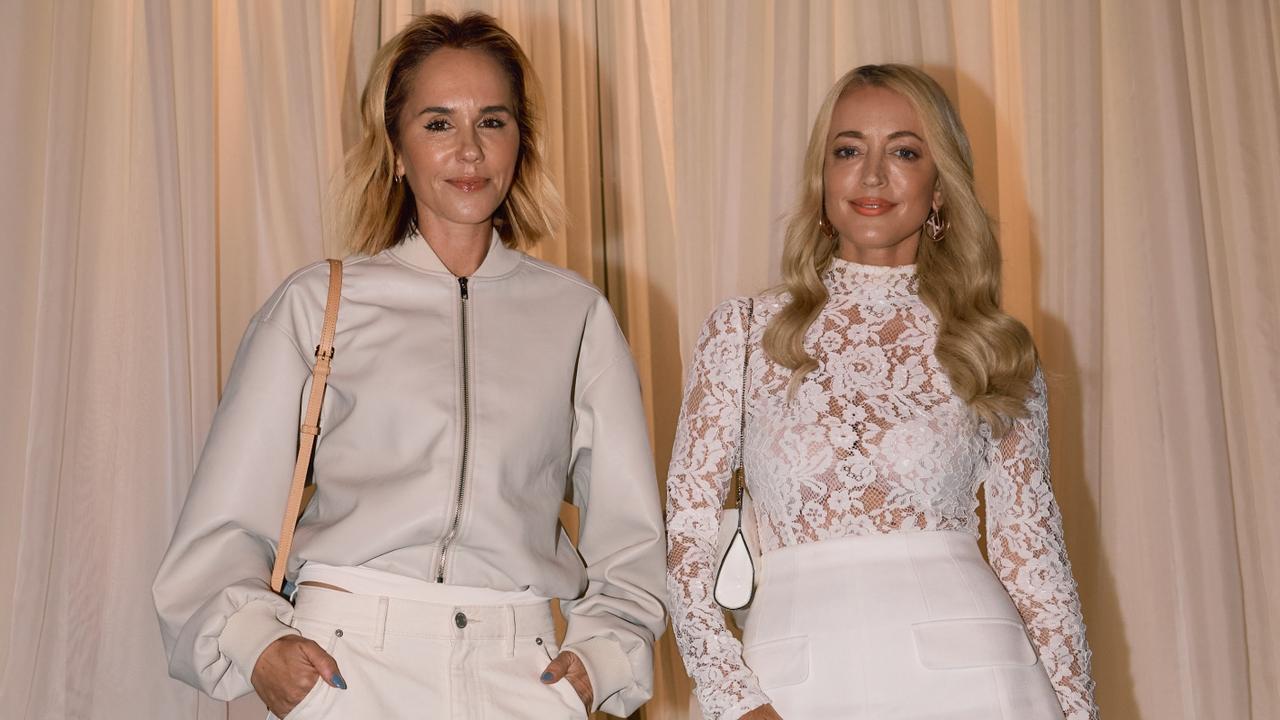Julie Bishop: ‘Why should I apologise for being feminine?’
AUSTRALIA doesn’t like its female politicians to be too female. But undeterred, and with a killer wardrobe, Julie Bishop is proving to be a unique kind of foreign minister.
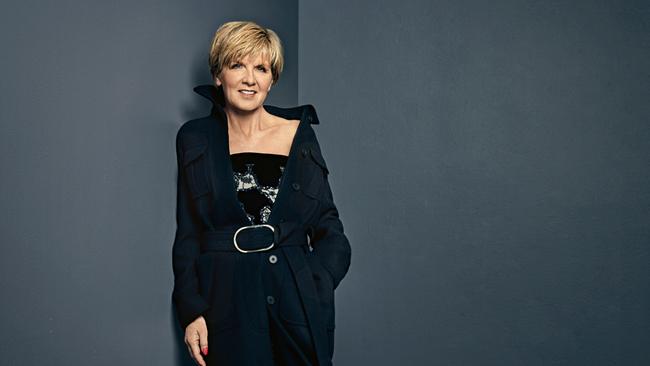
Stellar
Don't miss out on the headlines from Stellar. Followed categories will be added to My News.
JULIE Bishop’s bright pink fingernails clack against the iPhone screen as she scrolls through her photographs. “Look at my Amal set — she’s such a gorgeous girl,” says the Australian foreign minister, reaching over the table to reveal pictures of herself (in Armani) with Amal Clooney, the human rights lawyer and wife of Hollywood heart-throb George Clooney (in Dior), at a function to raise awareness of the persecution of thousands of Yazidi women by ISIS.
She pulls up another pic from the New York trip — Bishop is with three other female foreign ministers, who are all laughing. “There we all are, waving at [Canadian Prime Minister] Justin Trudeau.” She scrolls along to a picture of herself, Russian Foreign Minister Sergei Lavrov and US Secretary of State John Kerry at a recent meeting about Syria. “There’s me, there’s Lavrov, there’s Kerry. Can you imagine? Tense. The body language tells you everything.”
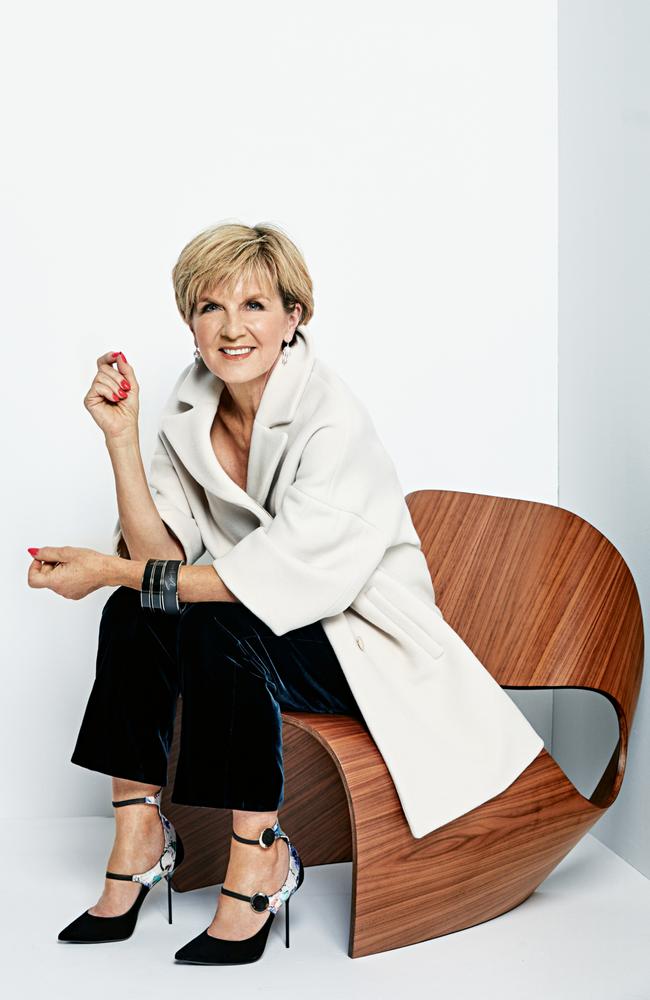
With her Tom Ford sunglasses, star-studded contact list and a figure most 20-year-olds would envy, Bishop is the kind of foreign minister many of us would like to be. She is one of the best performers of the Coalition government: hardworking, assertive and charming, able to banter with divisive UK politician Boris Johnson, stand up to the Russians, and fight for Australia’s interests in the most intimidating forums in the world. But she also has a handsome partner, a designer wardrobe (Sally at Armani has her credit card details and size), and is unashamedly feminine.
I have always loved fashion and beautiful clothes and magazines and all of that, that doesn’t mean I can’t have a serious career
“She presents the most sophisticated image on the world stage that Australia has ever presented,” observes Vogue Australia editor-in-chief Edwina McCann, who works with Bishop on the Australian Fashion Chamber. “It’s an image that a lot of young women would aspire to.”
Bishop arrives for her Stellar photo shoot in Sydney with a pile of Armani clothes from her own wardrobe. A mild stand-off with the Stellar editorial team ensues; she wants to wear her own clothing, they want her to wear the clothing the fashion editor has brought. Bishop gives a glimpse of the assertiveness she presumably takes into cabinet meetings. “I am not a model,” she says archly. “I am a foreign minister.”
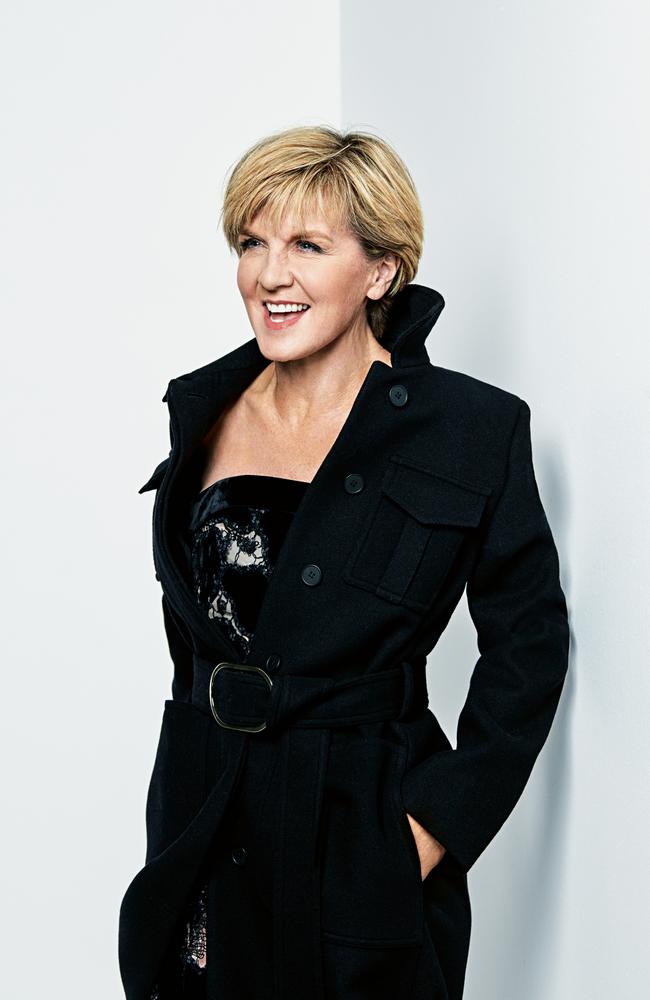
After a further exchange, she uses her diplomatic skills to negotiate a compromise. She rejects a leather skirt and black cut-out shoulder top, but agrees to try the items on the stylist’s rack that she might have selected herself. Peace deal successfully brokered, everyone gets to work.
Magazine photo shoots like this one have traditionally been dangerous territory for women in politics — hence, perhaps, Bishop’s caution. Australia doesn’t like its female politicians being too female.
The list of casualties is long. In recent years, Labor frontbencher Kate Ellis was excoriated for wearing high heels in a magazine shoot with Grazia, while Anna Bligh was accused of putting personal publicity ahead of Queensland when the then-premier agreed to a two-hour photo shoot with The Australian Women’s Weekly in 2011.
She presents the most sophisticated image on the world stage that Australia has ever presented
Bishop, however, seems to be in a league of her own. Not only has she graced the pages of Vogue Australia, Harper’s Bazaar and Marie Claire, but she loves clothes, likes to look good and enjoys reading fashion magazines. Unlike those who have come before her, the woman featured in those glossies, wearing Armani and Kailis pearls, is the real Julie Bishop.
“I don’t think we should apologise for our femininity,” she says. “I don’t think we should apologise for our interest in fashion. I have always loved fashion and beautiful clothes and magazines and all of that, that doesn’t mean I can’t have a serious career and hold deeply complex, serious conversations about world events with people. To suggest you can’t do both is insulting.
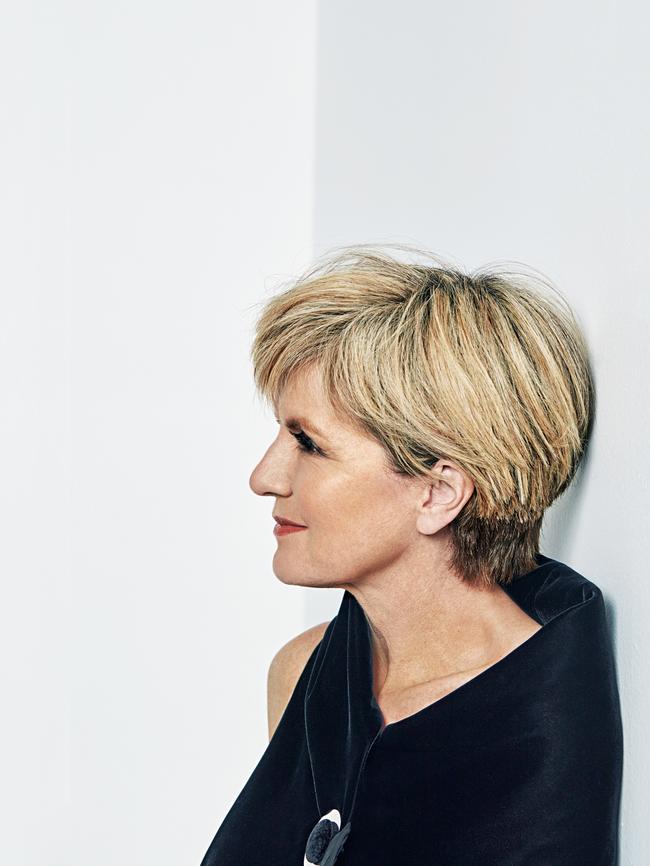
“The most positive feedback I get tends to be from young women, who say, ‘That’s what I want to hear. I don’t want to hear that I have to apologise for who I am; I want to be able to back my own intuition, my own judgment, have confidence in my beliefs and who I am.’ If you are confident, if you are relaxed in your own skin, don’t let them define you. Don’t let other people define you.”
Perhaps it’s the confidence that comes with a second term in a job she loves, but Bishop is revealing more of her personality than ever before. The rainbow set of boxy jackets she wore in Opposition is giving way to edgier fashion choices, such as the suit with shorts she wore to meet British Foreign Secretary Boris Johnson. (“It’s this year’s fashion, so I wore them,” she says. “It didn’t occur to me at the time that I was making some kind of statement.”)
I don’t call myself a Marxist, I don’t call myself a feminist, I don’t call myself a range of things. If others wish to, that’s fine.
We see fewer death stares, and more emojis. She sits in the front row at the David Jones fashion show. This year, she’ll sandwich Derby Day between meetings and a sitting of parliament. She was rarely photographed with her last boyfriend, former Perth Lord Mayor Peter Nattrass, but she is regularly out and about with her partner of two years, the rather dashing former pharmacist David Panton, who sometimes travels with her. “He’s a very special person in my life,” says Bishop. Funny? Smart? “All of that,” she replies with a coy smile.
One former colleague says Bishop is not above using her femininity as an asset. “She can be flirty,” he says. “The persona changes, and the blokes like it. I’ve seen it work. She knows how to use it.”
Bishop’s enemies — and she does have them within her party, mostly allies of former Prime Minister Tony Abbott who believe, despite her denials, that she betrayed him — accuse her of being starstruck. They say she loves parties and globetrotting and celebrities a little too much.
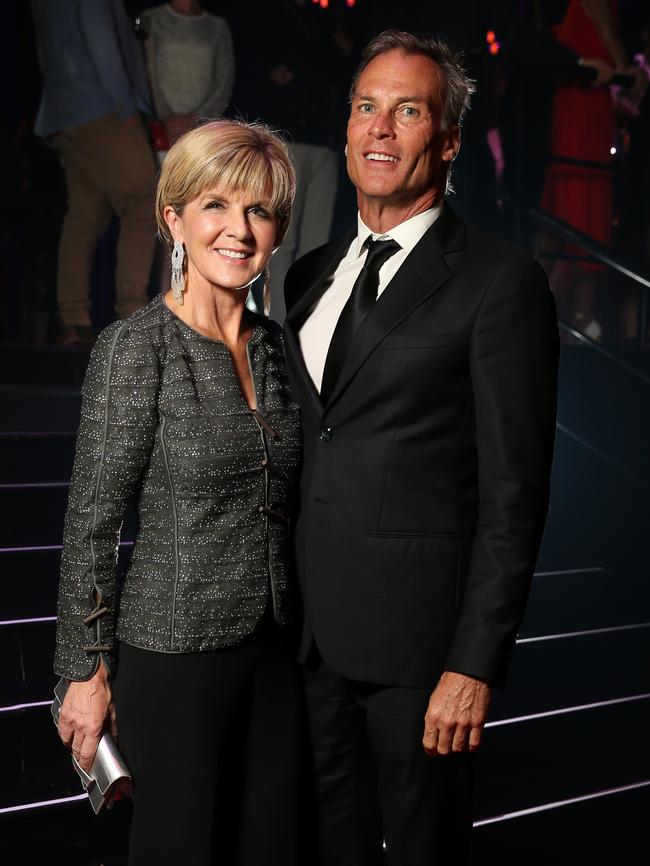
But supporters argue there’s no reason why she can’t play as well as work. It might
even be an advantage.
“The personal relationships and connections you are able to establish, the longer you are in the role, actually work very much in the interests of the country,” says Bishop. “Because if you are able to establish a rapport, a common interest, and continue to follow them up and remain in contact, there are many times when I have been able to use that personal contact to get through to someone, to ask if they will take a matter into account, to promote Australia’s interests in circumstances you might not otherwise have been able to. I swap mobile phone numbers as often as possible.”
Bishop likes some labels, but rejects others. She likes Armani and Rachel Gilbert and Escada, but she doesn’t like to be called a feminist. When asked why, she bristles. “I just don’t use labels to describe myself,” she says.
“If you want to know what I stand for, I am a Liberal. Where do I come from? I am a West Australian. What do I do? I am a foreign minister. Beyond that, I tend not to self-describe. I don’t call myself a Marxist, I don’t call myself a feminist, I don’t call myself a range of things. If others wish to, that’s fine. I don’t know why this is even raised, I must say.”
It’s raised because Bishop is, whether she likes the term feminist or not, a trailblazer for women. She’s the first female Australian foreign minister, and the first woman to be the deputy leader of the Liberal party. She’s held that job since 2007, under three leaders and through three leadership changes.
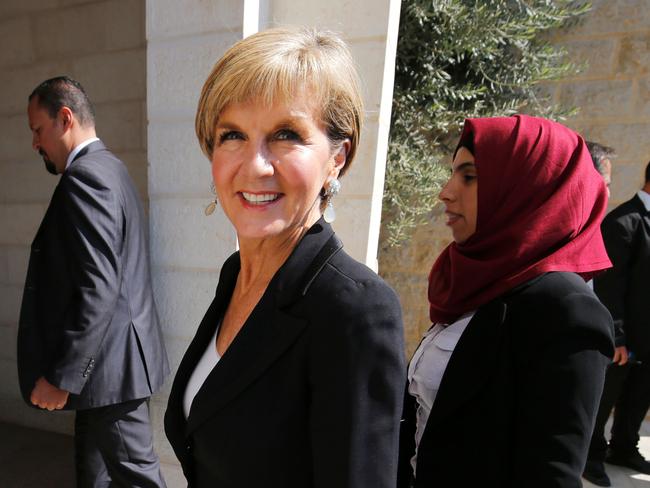
She is also a champion of women. In July, she appointed the first female Secretary of the Department of Foreign Affairs and Trade. She employs women on her staff. She is not, according to those who have worked with her, the type to climb up and kick down.
Bishop also uses her position to promote equal opportunity. “Julie has ensured that gender equality and the empowerment of women and girls are a central part of Australia’s foreign policy and international development work,” says former Democrats leader and Australia’s Ambassador for Women and Girls, Natasha Stott Despoja.
The foreign minister was the first person in parliament in whom Minister for Revenue and Financial Services Kelly O’Dwyer confided she was pregnant. “When you have exciting news like that, there is also caution about how you go about telling people,” says O’Dwyer. “[Julie] was a source of advice to me at the time, and a source of support. She will listen, she will keep a confidence, and she will problem-solve.”
Bishop is sensitive to the struggles of women balancing work and family. She says former Prime Minister John Howard was just stating a fact when he said recently that women’s ability to participate in politics is constrained by their role in caring for others.
“The point he didn’t go on and make was how can we ensure that federal parliament can be more family friendly, so women can take part in politics,” she states. “It’s not only parliament, it’s the 24/7 nature of the job, and I don’t know if that’s often understood. You are essentially on call seven days a week.”
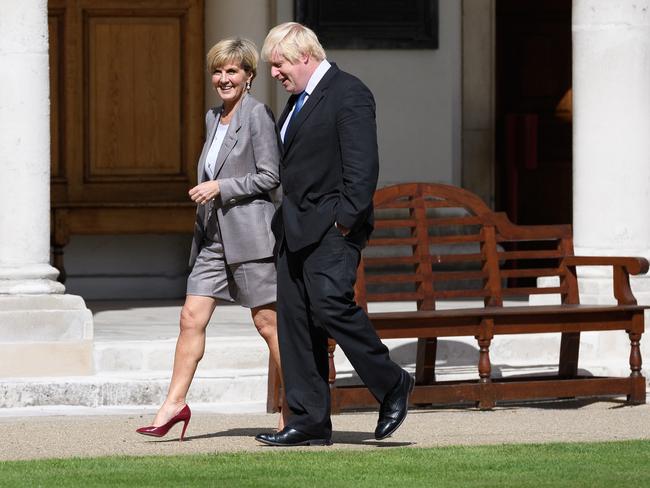
Politicians can make childcare more affordable and tailor parental leave schemes to the needs of men and women, but the real change, she says, must come from the bottom up. “Policy considerations are one thing, attitudes are another,” she says. “You could have all of the policies available, but unless people are prepared to change the roles and be more flexible, it will all come to naught.”
In all meetings, you have to be confident, hold your ground... That’s not about being a woman, that’s about representing your country
Bishop works in a world that’s still jam-packed with men. Most of her meetings are with blokes in suits, sometimes in countries in which women are still at the bottom of the power food chain. When she visits those countries, she is pragmatic.
In Iran, she would not have been allowed into the meetings without a hijab. So she covered her head — a decision that prompted criticism at home — but chose a sparkly scarf by Armani with which to do it. “In all meetings, you have to be confident, hold your ground, and not take a backwards step,” she says. “That’s not about being a woman, that’s about representing your country.”
Bishop believes that any woman who can reach the heights of foreign minister — or prime minster, or prime minister’s chief of staff (Bishop says she never saw Peta Credlin, Tony Abbott’s former chief of staff, being subject to sexism; “I didn’t observe it”) – cannot claim to have been discriminated against because of their gender. “Of course there is always language or situations or things that are said or done,” she says. “It runs through your mind, ‘Would that have occurred if I were male?’ But I don’t let it get to me.”
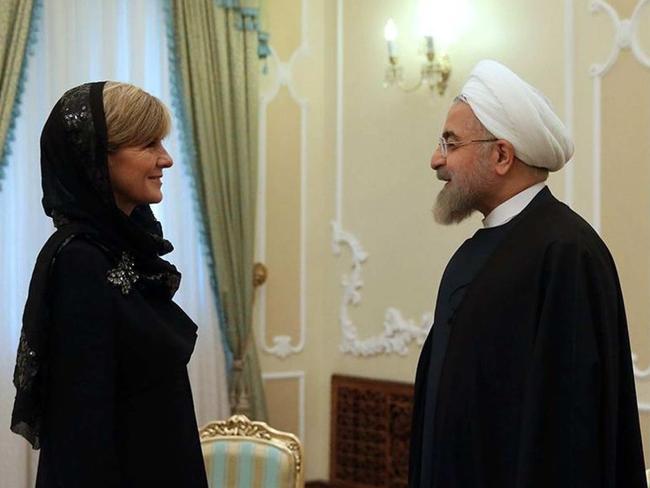
One would almost pity the man who tried that on with Bishop. She thrives on challenging situations. Within weeks of becoming foreign minister, she was wielding the gavel at the United Nations Security Council. I ask whether she was nervous. “It was amazing,” she says.
She was an active participant during the aforementioned meeting at which John Kerry and Sergei Lavrov argued over Syria. “I made a contribution, but I was witness to the exchanges between the US rep and the Russian rep, and you realise you are observing history in the making,” she says. “The significance of the events I am involved in doesn’t escape me.”
She has no ambition to be the leader of the party at some point in the future, but in my view she is extremely capable of being so
She happily name-drops, at Stellar’s invitation. Barack Obama, she says, is “very easy to get along with”. Hillary Clinton is “very professional, very charming, very direct”. Boris Johnson “is very intelligent, very quick-witted, but is also taking his role as foreign secretary very seriously”.
“There are some fascinating people I have met. Challenging. Interesting. Charming. Robust.” Such as? “The Russian foreign minister.”
Bishop is not nervous about a Donald Trump presidency. She met with his representatives during her last US visit. “I am pragmatic. You have to work with the hand you are dealt. You can’t wish the world to be the way you want it to be, you work with the world that is.”
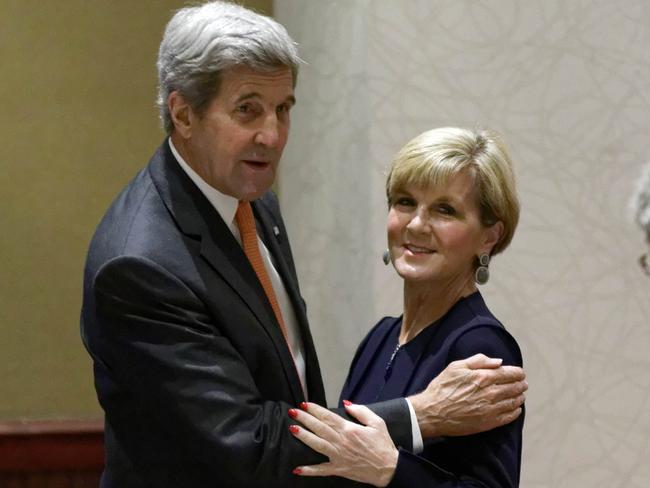
The foreign minister spends half her time overseas, a quarter in Canberra, and a quarter in Perth. The power plays in Canberra might not be as compelling as those in the United Nations, but they are just as important for a senior member of a government with a slim majority. Voters like Bishop, as do political donors. Some in her party do, some don’t. She says her ambition is to remain as foreign minister, but she won’t be drawn on whether she’d have a tilt at the leadership if the opportunity arose.
“I have fulfilled every ambition I had in politics, and that was to be foreign minister,” she explains. “It’s not a question of wanting to [be leader]. There are literally dozens of people who want to be the prime minister, who want to be the leader, and it’s determined by events far more than ambition.”
Her friends say she doesn’t have her eye on the top job. “She has no ambition to be the leader of the party at some point in the future, but in my view she is extremely capable of being so,” says Brendan Nelson, the first Liberal leader Bishop served under as deputy.
Bishop makes her job look glamorous, but it’s gruelling, too. She works non-stop. On some trips she’s away for three of four nights, and catches all her sleep on planes. She copes by staying fit — she’s a keen runner — and eating well.
She celebrated her 60th birthday in July with no regrets, but excitement about what lay ahead. “I have a very challenging career, I have a very satisfying personal life, I am enjoying every moment of it,” she says. “I feel fit and healthy, and I am loving life.”
Originally published as Julie Bishop: ‘Why should I apologise for being feminine?’

